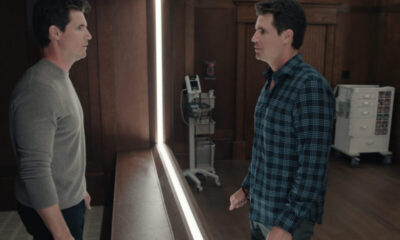Entertainment
HBO Max’s “The Pitt” Highlights Compassionate Teaching in Medicine

The HBO Max series “The Pitt” has emerged as a significant cultural phenomenon, earning acclaim for its portrayal of a fictional emergency room at Pittsburgh Trauma Medical Hospital. This Emmy-winning medical drama not only captivates audiences with its intense storylines but also serves as an insightful commentary on the nature of teaching and mentorship within high-pressure environments.
While many viewers focus on the medical drama’s realism, less attention has been given to the show’s underlying messages about teaching and learning. The series features Dr. Robby Robinavitch, played by Noah Wyle, who mentors a diverse team of medical interns. Set against the backdrop of a teaching hospital, the series presents unique opportunities for hands-on learning that extend beyond traditional classroom settings.
Education Through Popular Media
The influence of popular media on public perceptions of education is substantial. Scholars such as Adam Greteman and K.J. Burke emphasize that television, film, and literature can offer valuable lessons about schooling, often reflecting societal realities while providing an escape. In “The Pitt”, the depiction of education occurs in a high-stakes environment where interns learn to navigate life-and-death situations. This setting highlights the complexities of teaching amid trauma, a theme increasingly relevant in today’s educational landscape.
The COVID-19 pandemic significantly shapes the narrative of “The Pitt.” Throughout the series, flashbacks to the pandemic’s darkest days haunt Dr. Robby. Similar to healthcare professionals, educators faced unprecedented challenges during this time. A recent study from the University of Colorado School of Medicine revealed that the pandemic has adversely affected teacher recruitment and retention, as many educators experience burnout and mental health challenges.
Compassionate Teaching in Crisis
Dr. Robby’s character breaks away from conventional male educator stereotypes often found in media. He embodies vulnerability and compassion rather than fitting into familiar tropes such as the buffoon or the maverick. His portrayal aligns more closely with empathetic characters seen in films like “Half Nelson” and “Weapons”, who connect deeply with those they guide.
In one poignant episode, Dr. Robby suffers a panic attack, a direct result of his experiences with PTSD stemming from the pandemic and the loss of his mentor. This personal struggle informs his compassionate teaching methods, which resonate with current calls for trauma-informed approaches in education. As he navigates personal and professional challenges, Dr. Robby illustrates the importance of understanding the diverse experiences of students, who often confront their own mental health issues exacerbated by the global climate.
The series also showcases a diverse cast that reflects the multicultural fabric of modern classrooms. The various languages spoken by the interns and staff highlight the necessity of equity and inclusion in teaching practices, especially as educational institutions grapple with evolving demographics. The reality is that while classrooms in North America are becoming increasingly diverse, the teaching workforce does not always reflect this change.
Addressing Systemic Issues in Education
In a particularly impactful episode, a mass shooting at a music festival leads to an influx of victims into the hospital, paralleling real-world events that prompt educational institutions to conduct lockdown drills. Such incidents reveal the urgent need for systemic change within both healthcare and education. As Dr. Robby faces pressure to prioritize profits over patient care, the narrative underscores the importance of valuing interpersonal connections and compassionate teaching.
The series teaches us that now, more than ever, we need to value face-to-face interaction.
As post-secondary institutions continue to struggle with financial constraints in the aftermath of the pandemic, “The Pitt” advocates for educational frameworks that prioritize hands-on, real-world experiences. This approach encourages students to engage with their communities alongside experienced mentors like Dr. Robby, enhancing their educational journey.
In conclusion, Dr. Robby Robinavitch is not a romanticized hero like John Keating from “Dead Poets Society”. Instead, he represents a new vision of a compassionate educator—one who acknowledges his fears and flaws. Through its powerful storytelling, “The Pitt” highlights the critical role of empathy in teaching, making it a necessary reflection of the educators we need today.
-

 World4 months ago
World4 months agoScientists Unearth Ancient Antarctic Ice to Unlock Climate Secrets
-

 Entertainment4 months ago
Entertainment4 months agoTrump and McCormick to Announce $70 Billion Energy Investments
-

 Lifestyle4 months ago
Lifestyle4 months agoTransLink Launches Food Truck Program to Boost Revenue in Vancouver
-

 Science4 months ago
Science4 months agoFour Astronauts Return to Earth After International Space Station Mission
-

 Technology2 months ago
Technology2 months agoApple Notes Enhances Functionality with Markdown Support in macOS 26
-

 Top Stories3 weeks ago
Top Stories3 weeks agoUrgent Update: Fatal Crash on Highway 99 Claims Life of Pitt Meadows Man
-

 Sports4 months ago
Sports4 months agoSearch Underway for Missing Hunter Amid Hokkaido Bear Emergency
-

 Politics3 months ago
Politics3 months agoUkrainian Tennis Star Elina Svitolina Faces Death Threats Online
-

 Politics4 months ago
Politics4 months agoCarney Engages First Nations Leaders at Development Law Summit
-

 Technology4 months ago
Technology4 months agoFrosthaven Launches Early Access on July 31, 2025
-

 Top Stories2 weeks ago
Top Stories2 weeks agoFamily Remembers Beverley Rowbotham 25 Years After Murder
-

 Top Stories5 days ago
Top Stories5 days agoBlake Snell’s Frustration Ignites Toronto Blue Jays Fan Fury















